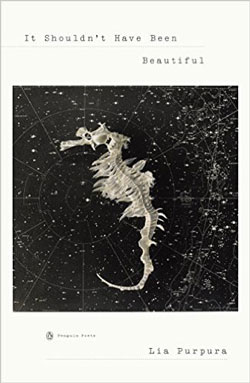It Shouldn’t Have Been Beautiful
by Lia Purpura
reviewed by Bryce Emley
Any grammarian will tell you that an effective pronoun has a clear antecedent; a poet may tell you that the best pronouns point to things the words on the page can’t quite name (Emily Dickinson’s “For Occupation–This–” comes to mind). In Lia Purpura’s third book of poems, It Shouldn’t Have Been Beautiful, Purpura proves to be a poet who, like Dickinson, dwells in the possibility of language we often too easily accept as exact.
Purpura opens “Gone,” the collection’s penultimate poem:
It’s that, when I’m gone
(and right off this is tricky),
I won’t be worried
about being gone
Contemplation over dying isn’t new poetic territory, but for Purpura, it’s not accurate enough to give departure such a stable identity. And so her rumination resolves with a Dickinsonian turn:
this moment
(stand closer, love,
you can’t be too close),
is not a thing I’ll know to miss.
I doubt I’ll miss it.
I can’t get over this.
Purpura’s seemingly nebulous word choices speak not to an inability to find the right words for what she means, but to words’ inabilities to mean. She opts for abstractions and pronouns to illuminate sincere, tangible sentiment because these are “tricky” matters we disserve when we try to convey them through personal experience, narrative, and the even more abstract terms we use to refer to them (e.g. “death”). In “Creation,” Purpura explains:
I want to get
a feeling
right,
not sensation
If the description of a feeling is inherently insufficient, what’s more accurate may be that absent antecedent, the unsayable thing that can’t quite get spelled out for a reader. “Creation” is a poem that’s ambiguously titled, equally a sort of ars poetica on the creation of art and a reference to Michelangelo’s The Creation of Adam. Purpura’s not interested in defining the color in the
space between
God’s finger and Adam’s
but rather
the not-yet
created
in that gap,
the moment held,
so the world becoming
cannot be made
to refer to
anything else.
This is a collection that shows the artist’s struggle for the exact: Michelangelo wasn’t attempting to recreate an accurate depiction of a particular sky no living viewer has seen firsthand, but an infinitely more complex moment the viewer can only feel (rather than see) in that viewing.
Purpura frames these pronouns and abstractions in Ashbery-like syntax that often circumvents easy reading. Take the opening lines of “Some Beauty” (whose title nods to Ashbery’s “Some Trees”):
Its nature
is ruthless, nothing
as simple as
loss being ruinous
Here, the central simile in Purpura’s discussion of the title/subject avoids any expected, clear one-to-one comparison the way Ashbery’s trees do (“each / Joining a neighbor, as though speech / Were a still performance”), as if to say that even the construction of our metaphors falls short of accurately portraying meaning.
Purpura’s poems perhaps come the closest to identifying the unidentifiable when making these moves in conjunction with her knack for wordplay and line breaking, as “Crape Myrtle” demonstrates:
I don’t know
what it meant, it kept
meaning
roughly, but
maybe that’s me
making it
more, or ferocious,
As with “Some Beauty,” Purpura constructs a somewhat labyrinthine syntax that makes grammatical meaning fluid while focusing that fluidity even more finely. The word “meaning,” aptly tasked to make up its own line, takes on its rare intransitive verb form while showing Purpura’s self-awareness of her own plight. Here is the poet’s struggle with the way our language, for all the poet’s cleverness and crafting, can’t seem to stop meaning different things. In “Relativity”:
Each thing’s
its own partner,
each always both,
depending on
where you stand,
Similarly, part of the experience of reading this collection is a continuing attempt to identify exactly what it is Purpura is up to. These poems—with their sparse lines, mathematically precise attention to word choice, heady responses to and examinations of their titles, and tendency to sacrifice lyric beauty in favor of intellectual depth—can read almost like entries in a kind of poet’s encyclopedia of living. But again, that’s not quite right.
As Carl Dennis notes in his blurb of the book, the poems in It Shouldn’t Have Been Beautiful may be more like “definitions-in-progress,” but even such a definitive term as this seems too limiting. By the end of the book, we’re left instead to call these poems, inherently disserved by definition itself, what they conclude:
Beauty persists.
Which, as truths go,
complicates
all we need to know.
Published on January 20, 2016

